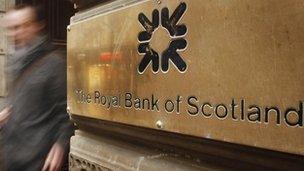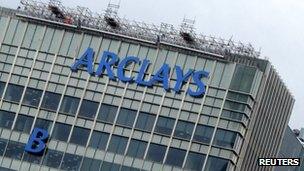Libor scandal: Seven banks face US questioning
- Published

RBS has admitted it is being investigated over Libor fixing
Seven banks, including HSBC and Royal Bank of Scotland, are to be questioned in the US for alleged manipulation of the Libor inter-bank lending rate.
Barclays, Citigroup, Deutsche Bank, JPMorgan and UBS have also received subpoenas from the attorneys general of New York and Connecticut.
Last month, Barclays was fined £290m by UK and US regulators for rigging Libor.
US regulators said they were investigating potential involvement by other banks in the Barclays scandal.
The investigation is predicated on the assumption that at least one other bank must have colluded with Barclays in any attempts to manipulate Libor rates, which are used as a reference to price trillions of dollars of financial products.
The US authorities will see whether supporting documents and testimony provide sufficient evidence for a criminal prosecution.
Criminal charges could also bolster the strength of civil lawsuits by investors seeking damages for losses due to any rate-rigging.
"This is the first time we're seeing a legal case that is trying to prove [collusion]. If they can prove it, then all the fees could amount to tens of millions of pounds," said Ralph Silva, a banking analyst at SRN.
UK investigation
A government-ordered review into Libor is currently being conducted by the managing director of the Financial Services Authority, Martin Wheatley.

Barclays was fined for trying to manipulate the Libor rates
The Wheatley review is examining how the Libor rate, the benchmark interest rate for trillions of financial contracts including some mortgages, is calculated and regulated.
The current Libor system is no longer a "viable option", Mr Wheatley said.
Libor is calculated using rates submitted by a group of leading banks who estimate how much it costs them to borrow in 10 currencies and 15 lengths of loans, ranging from overnight to 12 months.
There have been a series of allegations over the trading policies of banks in recent months.
Bank woes
On Tuesday, Standard Chartered agreed to pay $340m (£217m) to New York regulators to settle claims that it hid transactions worth $250bn with Iran.
Standard Chartered shares rallied on Wednesday after it agreed to settle the claims, after the institution had been threatened with having its US banking licence revoked.
Last week, New York's Department of Financial Services alleged that the US unit of the bank had illegally hidden 60,000 transactions with Iran worth $250bn over nearly a decade.
It accused the London-based bank of being a "rogue institution" for breaking US sanctions against Iran.
HSBC has also been accused of failing to prevent money laundering by the US Senate.
According to the Senate report, the US unit of HSBC carried out 28,000 undisclosed sensitive transactions between 2001 and 2007, an internal audit commissioned by the bank found. The vast majority of those transactions - worth $19.7bn - involved Iran.
As for Barclays, the Libor scandal led to the resignation of chief executive Bob Diamond as well as chairman Marcus Agius.
Last week, Sir David Walker was appointed as the new chairman.
He said he wants to review the way the bank operates and will begin his search for a new chief executive "within days".
Sir David is a senior banker who led the 2009 government inquiry into the rules governing how banks are run.
RBS has already admitted it is being investigated for fixing Libor.
It said: "RBS Group continues to receive requests from various regulators investigating the setting of Libor and other interest rates.
"We are co-operating with the investigations and are keeping relevant regulators informed."